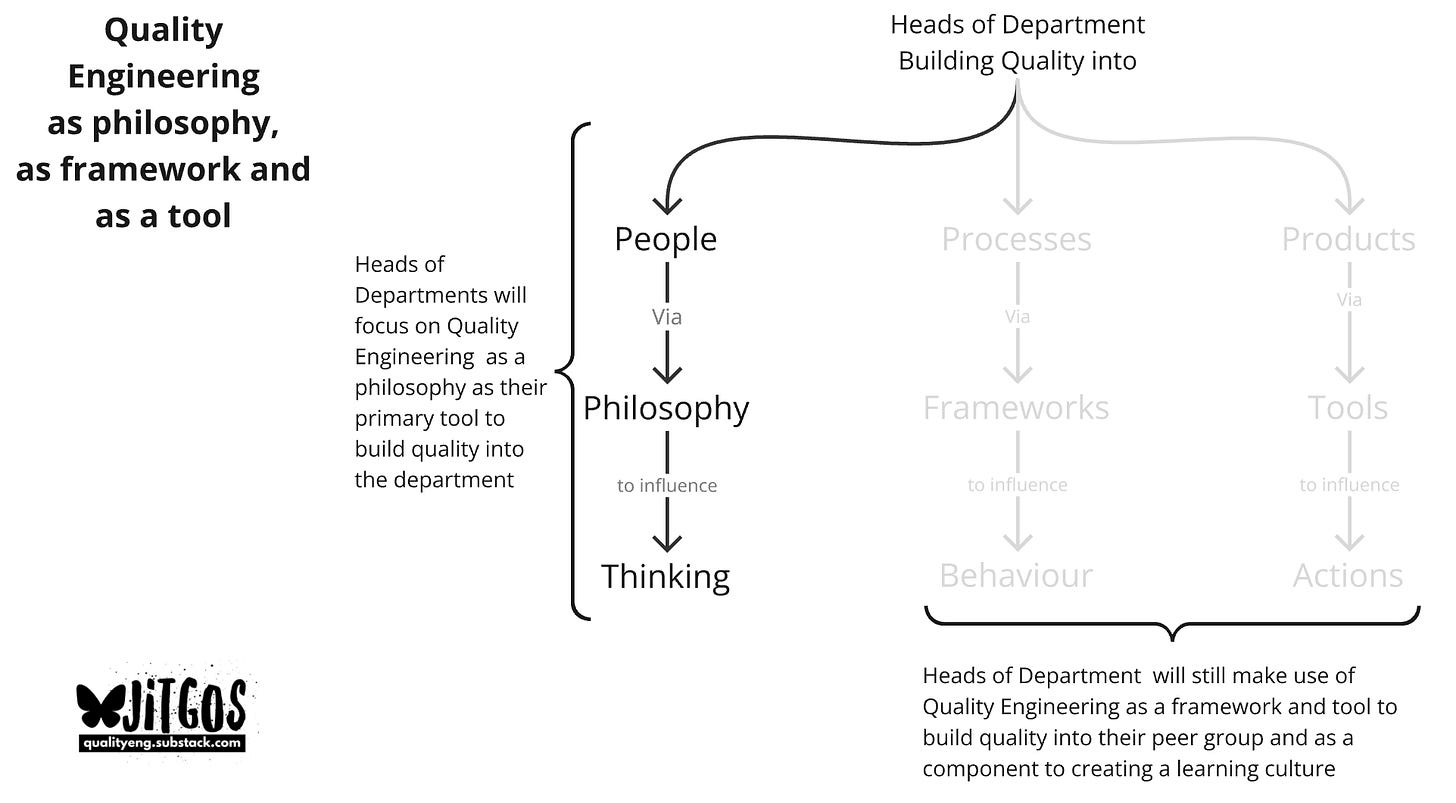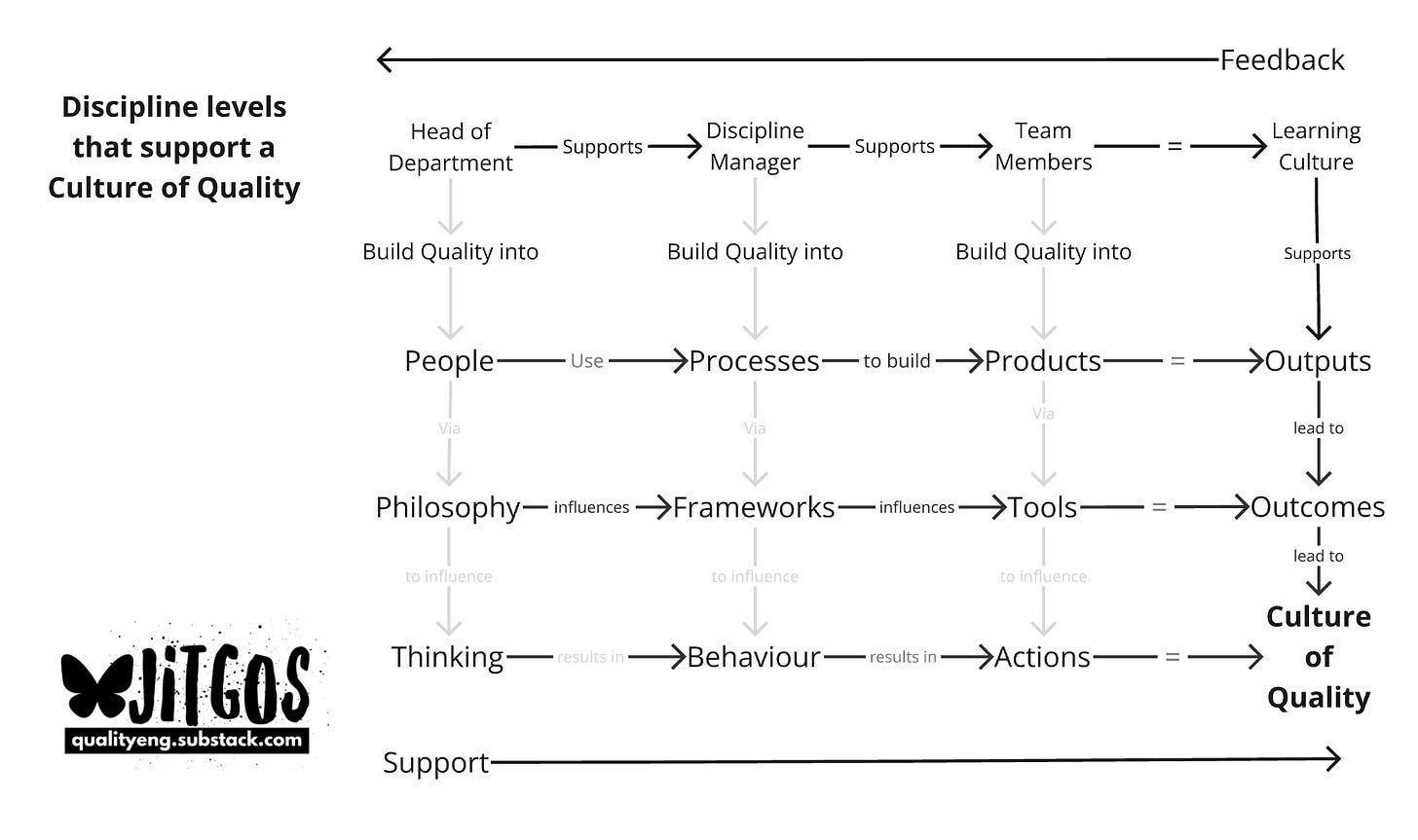
[Repost] Who should build a culture of quality?
Back in May, I reposted 'Quality Engineering as Philosophy a Framework and a Tool, where I described how you can foster a Culture of Quality through three different lenses:
By building quality via a philosophy, a framework and tools, you begin to nudge the socio-technical system at the levels of thinking, behaving and acting. This results in each level boosting the other, fostering a culture of quality throughout an organisation.
This week's post is a repost of my view on who is responsible for this work.
Working in Teams
Suppose your current role is working within an engineering team. In that case, this is where you will have the most significant influence. For instance, say you're a Developer, Tester, Delivery Manager or some other role that works exclusively with one team daily.
This likely means that your core responsibilities will be to that team. Therefore, you'll be in the strongest position to help build quality into the product via the skills of your discipline. This is where Quality Engineering as a tool is most directly applicable. Here, your daily work involves using specific tools and techniques to build quality directly into the product or service
As a team member, you'll also have discipline peers in other teams and departments, allowing you to learn and share ideas. With this approach, you can begin laying the foundation of a learning culture within teams and further improve your ability to build quality into the product.
Liked what you've read so far? The Quality Engineering Newsletter is reader-supported. Subscribe to receive future posts and help advance these discussions.
Working as a Discipline Manager
If your current role is as a Discipline Manager, your greatest influence will be those you manage. For instance, Engineering Managers, Test Managers/Test Leads, and Delivery Leads line manage Developers, Testers and Delivery Managers, respectively.
Being a Discipline Manager means one of your core responsibilities will be to those people, and one of your tasks will be personal development. While you wouldn't want to tell the people you line manage what to do, you will be helping them with how they do it. Managing people allows you to develop their understanding of how quality can be created, maintained and lost at the process level.
Working as a Discipline Manager is typically where Quality Engineering as a framework will be most appropriate, as you can coach and mentor the people you manage to build quality into their teams' processes. Your line reports will then be able to use that knowledge to adapt and create tools and techniques that allow them to use Quality Engineering as a tool.
As a Discipline Manager, you'll have a peer group of other Discipline Managers. This peer group is an excellent opportunity to see how they build quality via frameworks and what approaches and techniques their disciplines use. Collaborating with other Discipline Managers further develops a learning culture within the discipline.
Working as a Head of Department
If your role is a Head of Department, then your most significant influence will be at that departmental level. For instance, the Head of Engineering will have the greatest influence on those below them in the organisational hierarchy.
Operating at the Head of Department level means that one of your core responsibilities will be to set the direction and tone of your department. Therefore, you'll be in the strongest position to build quality into the culture.
Working as a Head of a Department is typically where Quality Engineering as a philosophy is most appropriate, as your role allows you to influence the department's thoughts via the values and behaviours you set.
As a Head of Department, you will also influence your peer group of other Heads of Departments, allowing you to nudge other parts of the organisation towards a Culture of Quality. Collaborating with other Heads of Department and line managing those below you further develops a learning culture throughout a department.

How does this help?
By embedding quality at the team, discipline, and departmental levels, you cultivate a comprehensive culture of quality:
Departmental level: Influences how people think about quality (philosophy).
Discipline level: Shapes people's behaviour towards quality (framework).
Team level: Directs how people create quality (tools).
This creates a powerful, interconnected system: each level influences the one below it, while also providing crucial feedback upwards. For example, a department's quality philosophy empowers discipline managers to adopt consistent language and values within their frameworks. This top-down influence reinforces the culture, demonstrating leadership support. Simultaneously, bottom-up feedback ensures values, behaviours, and language are effective and guides any adjustments.
Quality Engineering as a framework then supports the level below by giving the people working in Quality Engineering as a tool the processes they need to build quality in. While those working in Quality Engineering as a tool work with the teams, they can provide feedback on whether the processes are working or need adjustment.
One point I should make clear is that using the philosophy, framework and tool model does not mean that if you work in a team, you can only build quality via tools or that only Heads of Department can use Quality Engineering via a philosophy. You're just more likely to focus on these approaches than the others due to your sphere of influence.
For example, if you work in a team, you're only likely to have a small influence on your department's culture. Suppose you're the Head of the Department. In that case, you are unlikely to work directly on the products and services your teams create, limiting how much quality you can build into products.
As a team member, your peer groups are your team members and others in your job family. Therefore, you can influence the processes within your team, allowing you to leverage Quality Engineering as a framework. Within your job family peer group, you can influence the culture, allowing you to leverage Quality Engineering as a philosophy. But at both levels, you can bring your unique perspective of leveraging Quality Engineering as a tool, which allows others to learn from your successes and failures in building quality into products and services.
Sharing information vertically through disciplines and horizontally across peer groups allows for a learning culture to develop throughout a department. Leading to a more generative culture across an organisation where information flows more freely.
In summary
Working in teams means you have the most significant influence on building quality at the product level, allowing you to leverage Quality Engineering as a tool. Working as a Discipline Manager, you'll have the greatest influence on the people you line manage, allowing you to leverage Quality Engineering as a framework. Working at the Head of Department or function level means you'll have the greatest influence on the culture of a department, allowing you to leverage Quality Engineering as a philosophy.
Building quality into each level allows the organisation to develop a Culture of Quality that looks at the people, processes, and products more holistically. That can begin to foster a healthy socio-technical system.
By examining your position and influence within your organisation, you can use this model as a framework for considering how to improve quality across all levels.

However, what I've described above is almost a perfect situation where you have all the roles in place, and they want to build a Culture of Quality. In subsequent posts, I'd like to look at what happens if you're missing some of the roles and dig into some of the pros and cons of this approach. But also, where are all the quality engineers?





